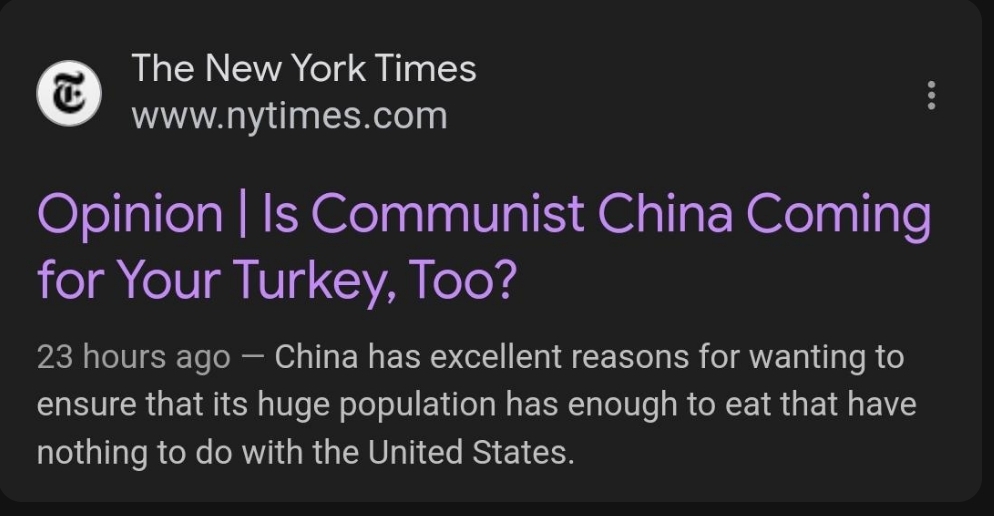Tl;dr Chinese lab grown meat and plant based meat is potentially going to undermine the American factory farms in production and price.
The article even brings up how it’s better for the planet than clearing forests to grow crops to feed animals for meat. But at what cost?!?!?
Also the title was even more red scare-y when first published.

The article is actually positive–there’s no “but at what cost??” in the article itself, which ridicules that attitude, so the title was purely clickbait playing on the Sinophobia-addled brains of the NYT’s readership.
Full text (Part 1)
In late September, 11 Republican members of Congress wrote to the directors of national intelligence and the Department of Agriculture’s Office of Homeland Security to warn of the latest threat emerging in China. They said China seeks to become the world leader in production of meat alternatives — part of a “targeted attempt to dominate global food supply chains” that could pose an urgent threat to the food security of the United States and its allies.
It’s the type of reaction we see often in Washington these days, where everything China does is viewed through the narrow and often skewed prism of national security, regardless of whether it’s positive for the world. Not satisfied with trying to render our gas guzzlers obsolete with its electric vehicles, the thinking goes, the Chinese Communist Party is apparently coming for our burgers and Thanksgiving turkeys, too.
The letter was right about one thing: China is serious about achieving breakthroughs in so-called future foods, which include lab-grown, plant-based and other alternative meats. As China’s appetite has grown, the government in 2021 made the creation of domestic alternative protein industries part of its national economic development strategy. It’s become a central component of wide-ranging plans to achieve food security, and funding is pouring into new research initiatives.
Sure, the geopolitical rivalry with the United States is almost certainly part of what is motivating China; it wants to become self-sufficient in food in case tensions with the United States worsen to the point of war.
But there is much more to this picture. The age-old way of producing meat — clearing forests to feed vast herds of greenhouse-gas-emitting livestock whose flesh is shipped through global supply chains — is hurting the planet. If scientists can figure out how to affordably cultivate meat in a lab at scale, it could become the standard mealtime fare of tomorrow. It might have to. And if China is willing to invest in technologies with potentially global benefits, Americans should view it not as a national security threat but as inspiration for how our protein markets could evolve, too.
China has excellent reasons for wanting to ensure that its huge population has enough to eat that have nothing to do with the United States. Older Chinese generations still harbor painful memories of mass hunger in the decades before China’s era of economic reform began in the late 1970s. President Xi Jinping has reminisced about going to bed hungry in his youth, with nothing but soup for dinner. He has called food security “a red line that would trigger terrible consequences were it ever to be compromised.”
Chinese official concern about food appears to be rising as the nation’s dietary needs grow and relations with the United States deteriorate. China has nearly 20 percent of the world’s population but less than 10 percent of its arable land. Its dependence on imported meat and other agricultural items, especially U.S. products such as soybeans (a key source of feed for China’s giant pork industry), worries Beijing, especially with Donald Trump threatening to start a trade war and U.S. military strategists identifying Chinese dependence on American meat as an Achilles’ heel.
China’s rising demand for meat and other foods is tremendously consequential for the rest of us, too. In 2021, China accounted for about 27 percent of global meat consumption, twice the U.S. amount, and Chinese demand is climbing fast. Economic growth is allowing the country’s people to enjoy richer and more varied diets, and as a result, today’s Chinese are bigger and taller than their ancestors.
But can the planet survive a significant increase in livestock production? Today the sector accounts for 10 to 20 percent of global greenhouse gas emissions, and world meat consumption is expected to keep rising for decades as other developing nations follow China into higher-protein diets. As Patrick Brown, the founder of the U.S. plant-based meat producer Impossible Foods, put it in 2020, “Every time someone in China eats a piece of meat, a little puff of smoke goes up in the Amazon.” Such sentiments have stirred resentment in China. Its people are as entitled to a high-protein diet as anyone, and Chinese eat less meat per person than Americans do. But the planet doesn’t care about abstract notions of justice. Something’s got to change.
China’s goal is the holy grail of meat: commercially viable alternatives that taste as good as the real thing and can be produced at scale but without the emissions, production costs, land use and risk to supply chains of animal-sourced meat. In the United States this idea has inspired big promises from manufacturers and billions of dollars in venture capital funding over the past decade. But reality is setting in as industry players discover that producing cultivated meats in volume is far more difficult and costly than expected. China, with its state-directed approach, may be in a better position to crack the code. We have seen what its scientists and engineers can do when state planners put their minds and resources to solving difficult technical problems.
China remains dependent on many technologies developed in the West. But its unique ability to use subsidies, regulatory assistance and its enormous domestic consumer market to turn those technologies into affordable products is unparalleled. China observed Tesla closely, greenlighting Elon Musk’s Shanghai manufacturing plant, which began production in 2019, before marshaling its own carmaking industry to produce much cheaper analogues. China has raced ahead of the United States in renewable energy and is increasingly supplying the rest of the world with solar panels, wind turbines and electric cars.
The government is taking the same all-out approach on food security. Besides alternative proteins, it is stockpiling food imports and pushing forward on genetically modified crops. China is also employing innovations such as salmon farms in landlocked Xinjiang; pork skyscrapers where pigs are housed, fed and slaughtered on an industrial scale; and unmanned farms where drones and other automated equipment plant, fertilize and harvest crops.
Full text (Part 2)
Many Americans remain skeptical about proteins derived from nonanimal sources, but Chinese have been eating one of them — tofu — for a while now. It’s hard to imagine Chinese diners completely giving up meat, but when the government goes all in on something and prepares the public for it through state-controlled media, the people usually fall in line. If it can come up with a protein solution embraced by its own consumers, chances are this made-in-China version will go global, like its solar panels and electric vehicles.
To their credit, the Republican representatives’ letter acknowledged that the United States needs to find a way to remain competitive in this critical emerging sector, too. Let’s hope that China’s push into the alternative meat industry does not become another cynical opportunity for American lawmakers to demonize Chinese intent but is embraced as a scientific and commercial challenge. Competition is no bad thing; it can drive innovation faster and in new and necessary directions.
But if America stands in the way of progress that may be good for the world, it will only make us look like part of the problem. China will eat our lunch — or, rather, stop eating ours and start eating its own.
Some quotes:
It’s the type of reaction we see often in Washington these days, where everything China does is viewed through the narrow and often skewed prism of national security, regardless of whether it’s positive for the world. Not satisfied with trying to render our gas guzzlers obsolete with its electric vehicles, the thinking goes, the Chinese Communist Party is apparently coming for our burgers and Thanksgiving turkeys, too.
…
The age-old way of producing meat — clearing forests to feed vast herds of greenhouse-gas-emitting livestock whose flesh is shipped through global supply chains — is hurting the planet. If scientists can figure out how to affordably cultivate meat in a lab at scale, it could become the standard mealtime fare of tomorrow. It might have to. And if China is willing to invest in technologies with potentially global benefits, Americans should view it not as a national security threat but as inspiration for how our protein markets could evolve, too.
…
As Patrick Brown, the founder of the U.S. plant-based meat producer Impossible Foods, put it in 2020, “Every time someone in China eats a piece of meat, a little puff of smoke goes up in the Amazon.” Such sentiments have stirred resentment in China. Its people are as entitled to a high-protein diet as anyone, and Chinese eat less meat per person than Americans do.
…
But if America stands in the way of progress that may be good for the world, it will only make us look like part of the problem. China will eat our lunch — or, rather, stop eating ours and start eating its own.
Idk, I guess my first read through was with the title and image in mind, phrases such as “so called future meat” like it’s not something that’s available at a small scale ATM and “holy grail” as if the goal is some unattainable pie in the sky made it come off as “good on them for trying! Congrats!” while making the Republicans in the first paragraph sound unreasonable and silly seemed really peak Lib to me
I can see how the title would color your reading of the article, but they immediately address that in the second paragraph. I think the author (or perhaps editor, given all the title changes) realizes that your average Times reader isn’t even going to bother clicking on a headline which seems positive about China, so they have to reel them in with a title and a leading paragraph before actually saying what they actually want to say.
I think the op ed does a great job at explaining China’s motives, which basically lead you to the conclusion that, well duh, what country in China’s situation wouldn’t be trying to improve their food security, and also that increased Chinese food security is not an attack on the US. The only thing that I raised an eyebrow at was this bit
It’s hard to imagine Chinese diners completely giving up meat, but when the government goes all in on something and prepares the public for it through state-controlled media, the people usually fall in line.
but given how grounded the article is as a whole (they even managed to mention Xinjiang as simply a place in China!!) and how much time they spend countering Sinophobic canards I’ll let it slide, since that makes the author better than 99% of the absolute scum of the earth that usually populates the Times op ed section. I mean, compare it with one of the other op eds the author links to (“Let’s All Take a Deep Breath About China”) which pulls out all the tired tropes:
Of course, the United States should actively confront President Xi Jinping of China about his repression at home and aggression abroad. As a scholar of China’s political system, I worry about how Mr. Xi has made his country even more authoritarian; about increasing human rights abuses in China, particularly those directed at the Uyghur population in Xinjiang; about Beijing’s crackdown on Hong Kong, its threats toward Taiwan, its increasingly cozy relationship with Russia and its support for the war in Ukraine. America must remain alert to legitimate concerns about well-documented Chinese activities such as espionage and cyberattacks.
But should our policymakers really be focusing on Tutor.com, Chinese garlic or “Barbie”? Or should they concentrate on the more serious threats posed by China’s authoritarian system, or the many other issues that meaningfully affect the day-to-day lives of Americans?
When that’s the baseline, I’m not going to get too heated about “state-controlled media” when the author never does this pathetic State Department groveling act–this op ed is the most levelheaded writing on China a lib is likely to ever read.
As far as the holy grail thing, I didn’t take it that way. I think the author is correct that it’s a difficult problem (if it weren’t, someone would have solved it already), but they also correctly identify that the Chinese system is uniquely equipped to tackle these difficult problems and may have a better chance than the venture-capital-directed American firms, and they do so without the usual whining about unfairness.
I can see there’s a more neutral tone without regard to the (previous) headline, I guess it painted the article in a more condesending tone upon first read through. I do agree it’s better than most articles though. Even so, the “Journal of Record” is embarrassing itself at best.
Is communist China coming for your cock, too?
https://www.globaltimes.cn/page/202111/1238161.shtml
If by “your cock” you mean young Chinese trans kids, then maybe.


The chinese spies on tinder are
What do they mean “Too”?
What has China taken from me before?
I keep losing tubes of lip balm and I’m pretty sure the CCP is responsible.
Every time you lose a sock in the washing machine? That was the See See Pee. Xi rappelling down from the ceiling like Mission Impossible to steal a single sock
对不起,同志
可是我们偷了你的“Harold Holt”和你的“D.B. Cooper”。
Yeah that’s right, that was us.
Wait… Where my pp?
Thanks Xi!!!

They have changed the title for the 3rd time in 24 hours
they already succeeded
 exists
existsHas the NYT ever changed a headline for the better?
The latest title is “China might be coming for turkey, good.” Which is better I suppose.
Not satisfied with trying to render our gas guzzlers obsolete with its electric vehicles, the thinking goes, the Chinese Communist Party is apparently coming for our burgers and Thanksgiving turkeys, too.
NYT or Fox News?
My god this some really lazily blatant propaganda lmao
The sad part is that this is all it takes to get the libs ready to condone the most unspeakable acts of violence imagineable
Chinese lab grown meat and plant based meat is potentially going to undermine the American factory farms in production and price.
BASED BASED BASED BASED BASED BASED
Once again ol’ porko doesn’t like the free-market when someone else gets to enjoy an upside of it.
Employers being spoiled for choice when it comes to hiring? Making it impossible to get a job? That’s good ol’ capitalism baby. Just bootstraps your own job!
Consumers get to have an option of Chinese products of higher quality and for cheaper? Nooooo! Gobermint pls help! Protectionism NOW!
I like how the original publishing editor made the headline
Is Communist China Coming for Your Turkey, Too?but then the preview snippet just saysChina has excellent reasons... that have nothing to do with the United States.So comically disjointed.See I got pay walled the first time where the first paragraph was about “11 Republicans did yada yada yada about China’s X industry” so to the average Reddit/Facebook lib who reads the headline and move on, they get their China bad microdose, and even in the preview body it’s “Republicans did X” before the paywall hits for the tiny amount of yanks that click through. It feels engineered for Libs sitting through Thanksgiving with their MAGA family members by going in their phones.
They do go in about how China’s initiative for food security and plant based/lab grown meat is a “holy grail” that’s ultimately better for the planet but the redditor had stopped reading way before that.

Those lazy assholes are spending that 1.6 billion dollars budget as well as the Kamala campaign fund I see
The issue is, these freaks all fall for anti-China propaganda.
I just want to try lab-grown mammoth meat before I croak, is all.
Your turkey, your penis, your gun, your gas car, your 50 inch tv, your porno collection, is NOTHING safe from these WICKED Asians?
Not beating the treatler allegations. If you demand your turkey comes with suffering, your fucked up.
what gets me isn’t that the nyt continues publishing the most blatant, status-quo-reinforcing lies imaginable. what gets me is that millions of americans continue to take it seriously as a source of information and consider themselves Serious People because they Read the News. fucking joke of a country
Death to America
How DARE those east asians do anything that doesn’t serve the west? - NY crimes.
Wow China not doing a holocaust on animals for taste pleasure? How dystopian and antithetical to our American society


















